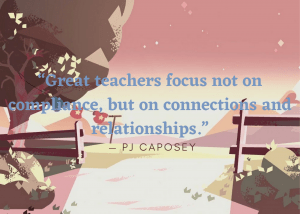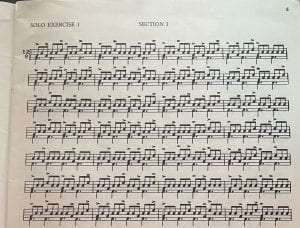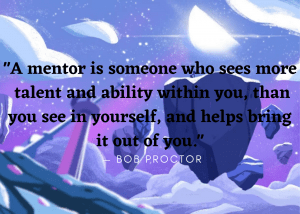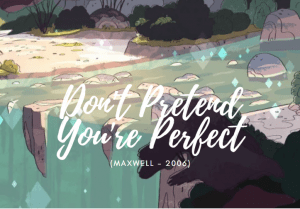Welcome to yet another progress report on my ever-growing drumming adventure with the guidance of my mentor, Jason Overy.
Since last time, almost everything has been smooth sailing, and my improvement has been steady. I haven’t had any remotely significant problems within the recent time span, so the most difficult mentoring challenge has been the communication issue from the very beginning of the project. (Refer to In Depth Blog Posts 1 and 2) The communication has been good since then because my mentor and I have been making sure to stay in touch, and we keep updating each other on schedule changes and events that will be happening, such as Mr. Overy’s tour with one of his bands next weekends. We have been using texting as our method of communication, and it has proved to be very affective for us as we can share information and just scroll up our message history to find it again. By doing this, help was very accessible for when I find something challenging or if I need advice or tips from Mr. Overy, such as practicing methods. One example of this was when I was having a little bit of trouble getting my paradiddles to be controlled. When I reached out to Mr. Overy, he taught me a method using a metronome, and changing the value of each beat while practicing paradiddles along with the metronome. Another reason why good communication has been working well is because we often update each other with our schedules. Mr. Overy’s lesson schedules with his other students seems to be quite inconsistent probably due to some of his students cancelling lessons every few weeks without any strict schedule, so Mr. Overy keeps me updated on any time slots that become free so that I can choose which time slot works with me best.

Not only has our communication been good, but our meetings. Have been productive and fun as well. Although, one thing that could be working better is my video taking methods. In my learning contract, I decided that I would take videos of the drumbeats that I knew and compare them, but I don’t get a chance to film at Mr. Overy’s studio every week. The very first week, I had already told Mr. Overy in the beginning that I would be filming a little bit of myself if I could, so I was able to successfully capture a video of myself playing my first drumbeat. Since then, I haven’t been able to film videos at the studio because I keep getting caught up in the meeting and we run out of time. Due to this, I have been recording myself on my own drum kit, which admittedly, doesn’t have as good of quality. So, I would like to start keeping it consistent and leaving at least five minutes at the end of each lesson to film a little bit of what I’ve learned to share on my blog post and compare to my last video. I can make sure this happens by informing Mr. Overy of this decision and make sure that he’s okay with it. I can also remind him every lesson so that I don’t forget. I will also dedicate a folder for In Depth videos on my phone so that I can keep it all organized.
During the weeks before my meeting this time, practiced the basics as always, and mainly focused on the newly introduced beats such as the paradiddle drumbeat, and the basic jazz swing beat. I also have been searching up famous drummers such as Buddy Rich, Gene Krupa, and Art Blakey. Mr. Overy said that it would help me find what kind of drumming I want to pursue, and that I should search for beats and songs I would like to start playing. Also, during the break, Mr. Overy has given me many new books such as the syncopation books because he wants me to start developing independence of my limbs, so I’ve been practicing those as well. Mr. Overy said that these books were really helpful exercises and made a big difference in his prior student’s drumming. And, of course, I’ve continued to practice the Wilcoxon drum solos.
During our fourth meeting, I demonstrated my basics to Mr. Overy for the last time. He said that he’s seen enough of my basics and says that I’m already quite good at them, so he won’t check in with them, but I would have to continue to practice them. This would also allow more time on the drum set, which means that I’ve made quite a lot of progress. One thing that Mr. Overy did say was that I wasn’t using my fingers as much as I should and gave me a couple of exercises to do to help me “click into my finger gears”. From there, we moved on to our drumometer games where I got 572 on singles, 918 on doubles, and 1055 on multiples.

After playing the game, we went straight to the drum kit. Just to see what my skill level was at and how much I could handle, Mr. Overy threw a brand-new concept and drum beat with an improvised solo at me and asked me to try it. It didn’t go very well, and I couldn’t play it as I didn’t get to practice it. Mr. Overy expected that I wouldn’t be able to play it and told me that I would start moving into more difficult exercises and concepts. So, he gave me a couple of licks I could start practicing and using. These include the “bucket of fish” and the “bucket of fishita” licks. These are essentially just short beats and patterns you can play, and the names are how the beat sounds. Once I had understood how these worked, he gave me a couple of workbooks to help me develop independence in my limbs to be able to start more complicated drumbeats.
Drum exercise 1
Drum exercise 2
When watching these two videos, pay attention to my left hand and my leg. My right hand is always playing the jazz swing on the ride, and the times my left hand and right leg play differ every measure. I found this to be quite difficult in the beginning, but I believe I’m starting to get the hang of it.
Once again, I’ve had so much fun learning this new passion of mine. As I’m starting to dive deeper and get into the more difficult work, I know I’ll have to put more effort into practices, so I’m quite excited to devoting lots of time into this project. I’m so glad that I have Mr. Overy as my mentor as he really loves the idea of me taking the lead in my learning and continues to encourage me doing this by choosing songs I enjoy, and helping me learn them on the drums. . I look forward to improving more.




 Using this knowledge from this book and
Using this knowledge from this book and 